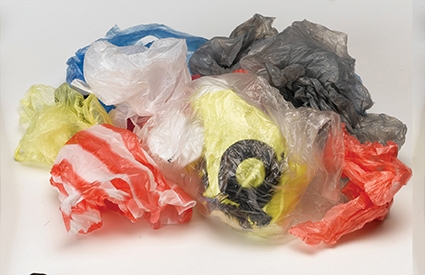The Plastic Bag Polemic
Op-Ed
I walk down the narrow, crowded streets of Tbilisi, negotiating the approaching pedestrians, having just arrived for the first time. There are sharp, screaming horns on the roads, beggars with defeated looks on their faces as I walk past, and the weird and wonderful sound of the Georgian language being carried by the crisp winter air. This new and alien city is a bit overwhelming at first, so I seek the comforting and familiar white light of a small local market to pick up some supplies for the evening.
Two packets of instant noodles and a bottle of juice. Nothing special. I decide against asking for a plastic carrier bag; my hotel is just around the corner and I have two hands. I approach the store clerk, lay my items down and reach for my wallet. When I look back up she has already bagged the items. Sneaky. Being British and a bit too polite, I don’t protest.
I choose a different store the next day though, and before I have a chance to say anything (apart from Gamajoba), the same thing happens. The day after, I ask the store clerk specifically not to bag my items before I hand them over, to which they return a look of confusion. More recently I entered a supermarket to buy some vegetables. After being told to individually bag separate items before weighing them, at the checkout I was given the already bagged items in yet another plastic bag.
We sometimes need something to carry our items from the store to our homes – that’s never going to change; we have a finite number of hands which are of a limited size. What we don’t need is a plastic bag to help carry our plastic bag containing one or two items.
As a European, I was appalled at this morbid overuse of an environmentally damaging material. Throwing them away does not destroy them; it is common knowledge among EU countries that even when we properly dispose of our plastic bags, they take around 400 years to degrade. If they don’t make it to being buried underground, they can reach oceans, beaches, streets, trees, and so many other places that Georgia prides itself on.
Georgia for me so far has proven to be one of the most – if not the most - forward-thinking countries of the former Soviet Union republics. I had no problem crossing the border with my EU passport, and it took less than an hour to obtain a residency permit. This joyful lack of bureaucracy is enjoyed by foreign investors, who can establish a business in just one day. I was expecting corruption to be a problem before I arrived, but it is non-existent. In fact, one of my first days here the police guided me, a confused and lost-looking foreigner, to my hotel. That has never happened anywhere else. It is one of the safest countries I have ever spent time in too, let alone lived in. Georgia’s way of thinking surprises me regularly, most recently decriminalizing cannabis. So why is it that the plastic bag usage is so far behind everything else?
The Environment Ministry revealed in 2014 that the average Georgian uses 525 plastic bags every year, while EU countries such as Ireland use just 14, and Denmark and Finland use only 4. These countries have certain restrictions in place. In my own country of the United Kingdom, we have been charging 5p (18 Tetri) per plastic bag in shops since 2015. Our neighbors, France, banned the use of plastic bags altogether in 2016. Estonia has made it cheaper to buy a paper bag in supermarkets, making plastic ones double the price.
I view Georgia as a beautiful flower which is thriving off the soil of its past. It is developing far quicker than its neighbors. It is a common belief that Georgia will most likely become another member state of the EU very soon. But before that can happen, a small number of habits such as the one discussed in this article need to change. So, next time you go to the store to buy something small, just think, ‘do I really need a plastic bag for this’?
Tom Day











